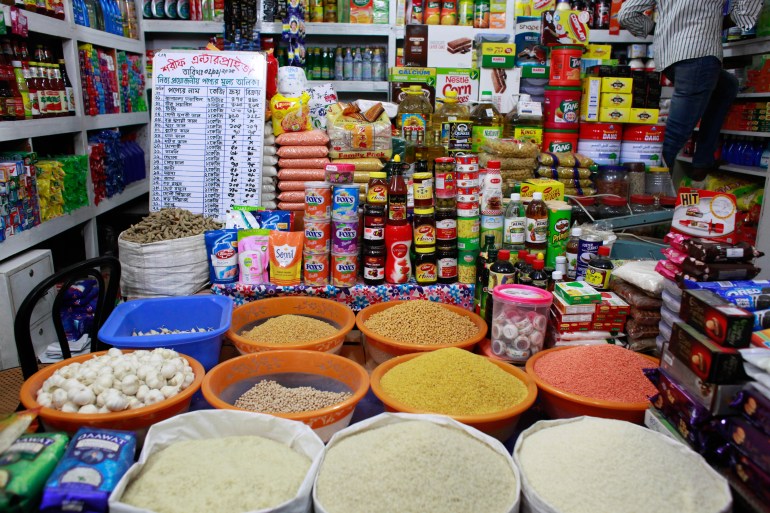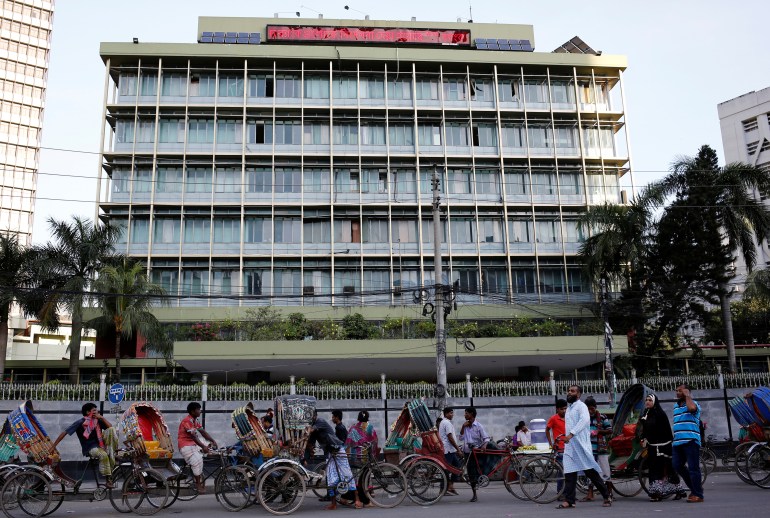Severe dollar crisis hobbles Bangladesh businesses
 Prices of at least 56 consumer products including imported edible oil, sugar and lentils have increased from 15 percent to as high as 60 percent in the past year [Mahmud Hossain Opu/Al Jazeera]
Fear of losing credit rating
Large businesses also have not been able to insulate themselves from the dollar crisis. In January, multiple ships carrying goods like sugar and cooking oil for the importer Meghna Group of Industries (MGI), a Bangladeshi conglomerate with $1.2bn in revenues, got stuck in Chattagram port for weeks as the guarantor Agrani Bank couldn’t make the payment to the foreign supplier due to a shortage of dollars. MGI, however, had paid the full amount to the bank for the products in local currency.
“We had to pay a daily shipping demurrage of $78,000 while the ships got stuck in the port because of the bank’s failure to settle the payment,” Monowar Ali, MGI general manager told Al Jazeera.
Agrani Bank declined to comment on its current US dollar reserves, but one of its officials who spoke on the condition of anonymity because he is not authorised to speak to the media confirmed that the bank is still scrambling for dollars to settle its previous letters of credit obligations.
On Tuesday, news agencies reported that Bangladesh’s private power producers, which provide more than half of the country’s electricity, were also short of the $1bn in foreign currency that they need to pay for imports of fuel oil to avoid an energy crisis in the summer.
Delays in dollar payments to foreign counterparts, meanwhile, have caused an image crisis. Bankers and economists fear that the failure to comply with payment deadlines, which are usually 180 days, will put Bangladesh at risk of a credit rating downgrade.
Moody’s, one of the big three global rating agencies, recently lowered Bangladesh’s local-currency and foreign-currency ceilings to Ba1 and Ba3 from Baa3 and Ba2, respectively. It also placed the country’s long-term issuer and senior unsecured ratings of Ba3 on review for downgrade.
Ba ratings indicate substantial credit risk.
“Bangladesh’s weakening external position raises external vulnerability and government liquidity risks in a way that may not be consistent with its current rating,” Moody’s said.
Syed Mahbubur Rahman, former president of the Association of Bankers, Bangladesh told Al Jazeera that if the country’s rating ultimately goes down, import costs for banks will significantly go up because they will have to pay commissions to third parties to get letters of credit confirmations.
Zahid Hussain, former lead economist at the World Bank’s Dhaka office, told Al Jazeera that towards the end of 2020, the three major ratings agencies – S&P Global Ratings, Moody’s and Fitch Ratings – all downgraded Sri Lanka’s credit ratings on expectations of deterioration due to the lack of favourable economic and fiscal conditions.
“If the situation does not improve, it surely can happen here,” he warned.
Prices of at least 56 consumer products including imported edible oil, sugar and lentils have increased from 15 percent to as high as 60 percent in the past year [Mahmud Hossain Opu/Al Jazeera]
Fear of losing credit rating
Large businesses also have not been able to insulate themselves from the dollar crisis. In January, multiple ships carrying goods like sugar and cooking oil for the importer Meghna Group of Industries (MGI), a Bangladeshi conglomerate with $1.2bn in revenues, got stuck in Chattagram port for weeks as the guarantor Agrani Bank couldn’t make the payment to the foreign supplier due to a shortage of dollars. MGI, however, had paid the full amount to the bank for the products in local currency.
“We had to pay a daily shipping demurrage of $78,000 while the ships got stuck in the port because of the bank’s failure to settle the payment,” Monowar Ali, MGI general manager told Al Jazeera.
Agrani Bank declined to comment on its current US dollar reserves, but one of its officials who spoke on the condition of anonymity because he is not authorised to speak to the media confirmed that the bank is still scrambling for dollars to settle its previous letters of credit obligations.
On Tuesday, news agencies reported that Bangladesh’s private power producers, which provide more than half of the country’s electricity, were also short of the $1bn in foreign currency that they need to pay for imports of fuel oil to avoid an energy crisis in the summer.
Delays in dollar payments to foreign counterparts, meanwhile, have caused an image crisis. Bankers and economists fear that the failure to comply with payment deadlines, which are usually 180 days, will put Bangladesh at risk of a credit rating downgrade.
Moody’s, one of the big three global rating agencies, recently lowered Bangladesh’s local-currency and foreign-currency ceilings to Ba1 and Ba3 from Baa3 and Ba2, respectively. It also placed the country’s long-term issuer and senior unsecured ratings of Ba3 on review for downgrade.
Ba ratings indicate substantial credit risk.
“Bangladesh’s weakening external position raises external vulnerability and government liquidity risks in a way that may not be consistent with its current rating,” Moody’s said.
Syed Mahbubur Rahman, former president of the Association of Bankers, Bangladesh told Al Jazeera that if the country’s rating ultimately goes down, import costs for banks will significantly go up because they will have to pay commissions to third parties to get letters of credit confirmations.
Zahid Hussain, former lead economist at the World Bank’s Dhaka office, told Al Jazeera that towards the end of 2020, the three major ratings agencies – S&P Global Ratings, Moody’s and Fitch Ratings – all downgraded Sri Lanka’s credit ratings on expectations of deterioration due to the lack of favourable economic and fiscal conditions.
“If the situation does not improve, it surely can happen here,” he warned.
 Bangladesh Bank, the country’s central bank, says rising import payments have depleted the country’s foreign exchange reserves [File: Mohammad Ponir Hossain/Reuters]
Will IMF loans make an impact?
Officials from the Bangladesh Bank said high import payments, especially since the Ukraine war has stoked commodity prices, was the main reason for the depletion of foreign reserves. However, Mezbaul Haque, the central bank’s spokesperson, predicted the crisis created by the shortage of dollar would be resolved within the next few months.
“Since we have curbed our spending on imports, our import bills will be lower in the coming months,” Haque told Al Jazeera. “This will ease the pressure on our dollar reserves.”
He said the net dollar balance of the country’s commercial banks has already increased up to $3.17bn from $2.2bn at the beginning of this year.
That amount however, is still half of the $5bn to $6bn that these banks typically had in their coffers before the country plunged into the ongoing economic turmoil, Rahman said.
The flip side of that, however, is that curbing imports is pushing up prices when inflation is already high. Data from the Consumer Association of Bangladesh, an advocacy and research organization, showed prices of at least 56 consumer products that included import-oriented edible oil, sugar and lentils have increased from 15 percent to as high as 60 percent in the past year.
But there is a glimmer of hope for the country’s beleaguered finances. At the beginning of February, Bangladesh received a dose of financial relief as the International Monetary Fund approved a $4.7bn loan programme. Bangladesh has become the third South Asian nation after Sri Lanka and Pakistan to seek IMF loans, but unlike its crisis-hit neighbours, Bangladesh has not asked for a bailout package, rather a stabilization package.
Australia-based Bangladeshi economist Jyoti Rahman told Al Jazeera that the IMF loan should help bolster the foreign currency reserves and avoid a credit downgrade.
“In addition to direct IMF financing, such programmes have a ‘crowding in’ effect as other international lenders will become more amenable to finance the current account deficit of Bangladesh,” said Rahman, who is hopeful that will happen soon.
Bangladesh Bank, the country’s central bank, says rising import payments have depleted the country’s foreign exchange reserves [File: Mohammad Ponir Hossain/Reuters]
Will IMF loans make an impact?
Officials from the Bangladesh Bank said high import payments, especially since the Ukraine war has stoked commodity prices, was the main reason for the depletion of foreign reserves. However, Mezbaul Haque, the central bank’s spokesperson, predicted the crisis created by the shortage of dollar would be resolved within the next few months.
“Since we have curbed our spending on imports, our import bills will be lower in the coming months,” Haque told Al Jazeera. “This will ease the pressure on our dollar reserves.”
He said the net dollar balance of the country’s commercial banks has already increased up to $3.17bn from $2.2bn at the beginning of this year.
That amount however, is still half of the $5bn to $6bn that these banks typically had in their coffers before the country plunged into the ongoing economic turmoil, Rahman said.
The flip side of that, however, is that curbing imports is pushing up prices when inflation is already high. Data from the Consumer Association of Bangladesh, an advocacy and research organization, showed prices of at least 56 consumer products that included import-oriented edible oil, sugar and lentils have increased from 15 percent to as high as 60 percent in the past year.
But there is a glimmer of hope for the country’s beleaguered finances. At the beginning of February, Bangladesh received a dose of financial relief as the International Monetary Fund approved a $4.7bn loan programme. Bangladesh has become the third South Asian nation after Sri Lanka and Pakistan to seek IMF loans, but unlike its crisis-hit neighbours, Bangladesh has not asked for a bailout package, rather a stabilization package.
Australia-based Bangladeshi economist Jyoti Rahman told Al Jazeera that the IMF loan should help bolster the foreign currency reserves and avoid a credit downgrade.
“In addition to direct IMF financing, such programmes have a ‘crowding in’ effect as other international lenders will become more amenable to finance the current account deficit of Bangladesh,” said Rahman, who is hopeful that will happen soon.